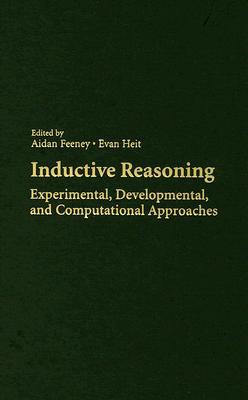

 |

|

The average rating for Inductive reasoning based on 2 reviews is 3.5 stars.
Review # 1 was written on 2013-05-29 00:00:00 James Lewis James LewisHow We Reason by Philip N. Johnson-Laird is a succinct and excellently written book which answers the question it poses, albeit in a one-dimensional manner. It is well-structured, opening with an introduction to mental models and how "at the heart of our reasoning are mental models of possibilities" (pg. 418). An overview of the unconscious, intuitive and emotional side of reasoning follows, though is dropped prematurely in favour of conscious reasoning. This middle "logic" section is the most difficult to read, including parts based on deductive reasoning (conclusions are necessarily true if the premises are), inductive reasoning (going beyond the information we have to reach a conclusion) and rationality (using counterexamples to test the validity of conclusions, and higher reasoning to test for the truth). The subsequent content is particularly engrossing, exploring how reasoning is developed, how it barely differs between cultures and how it can be improved. Afterwards the content dives straight back into the nitty gritty "logic" aspect of reasoning (problem-solving, causation, etc.) before concluding with real life examples which exemplify the human ability to reason. It's unclear whether "How We Reason" is supposed to read as a "Model Theory" thesis or a textbook overview of reasoning. The Model Theory postulates that we reason by constructing mental models, deriving conclusions from them and test the validity of such conclusions by searching for counterexamples. It's given pivotal status in the books conclusion yet is rarely explicitly mentioned throughout, nor is it pitted against competing theories. Yet the book remains narrow relative to its title, rendering a "textbook-like overview" to inadequately describe it too. Johnson-Laird is primarily concerned with conscious reasoning despite unconscious reasoning seeming to explain more of our everyday reasoning as evident in the second part of the book. He drops the topic and spends the rest of the book delving deep into the conscious aspects of reasoning which apply in artificial rather than natural settings. It is perhaps for the best he focuses on his speciality, as evident in the questionable chapter on mental illness in which he mistakenly compares OCD and hypochondria as being mutually exclusive disorders and considers the opposing stances of biologically indoctrinated psychiatrists with psychiatrists whom reject the concept of mental illness as being the same. While providing a strong critique to CBT's "poor reasoning" (pg. 92) account of mental distress, his hyper-emotion model supposition fails to capture the diversity of mental illness beyond basic anxiety disorders. Forming the bulk of the book are mental puzzles such as "if there is a triangle on board then there is a circle on the board. There isn't a circle on the board. What, if anything, follows?" (pg. 296). While the deconstruction and analysis of such questions and responses is superb, they can leave the reader feel drowned in rather meaningless dilemmas of immediate concern to cognitive scientists and logicians only. Johnson-Laird is acutely aware of such criticism and tries compensating by including chapters looking at how particular people such as Sherlock Holmes and The Wright Brothers may have reasoned. Such chapters are among the strongest and most enjoyable parts to read, but unfortunately fail to make the chapters on the other end of the spectrum any more colourful or relevant to the real world. These tedious and tricky to comprehend chapters explore deduction, induction, rationality and problem solving. The writer delves deep into computer programs and probabilities, though remains sympathetic to the reader suggesting them to skip parts if they induce "existential nausea" (pg. 199). Aside from the programs and numbers we are still left with a mind-boggling dense series of hypothetical puzzles after puzzles making it anything but a "page-turner" and leaving the reader lost as to what the writer is even arguing. This is not to the discredit of the writer whatsoever as this is simply the nature of the study of reasoning. His sharp articulation, use of real-life examples and witty humour made the grind through the problems manageable. "How We Reason" succeeds terrifically as an accessible account of the Mental Model theory, encompassing its inescapably gruelling characteristics. It is far too narrow and imbalanced to fit the bill as a definitive or comprehensive overview of reasoning which readers might expect. |
Review # 2 was written on 2009-08-13 00:00:00 John Brown John BrownThis book examines cognitive biases. Gilovich describes various dubious beliefs, such as faith healing and other homeopathic nonsense. He investigates the thought processes that affect our ability to make sound judgments. It encouraged me to examine the shortcomings of my own reasoning. Highly recommend. |
CAN'T FIND WHAT YOU'RE LOOKING FOR? CLICK HERE!!!